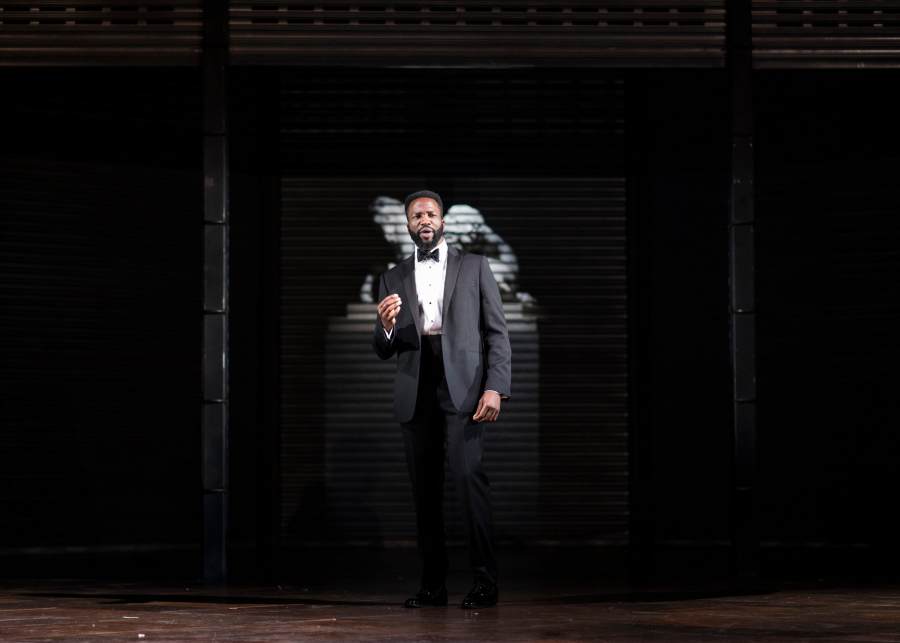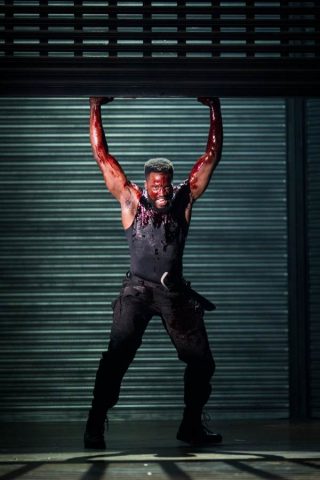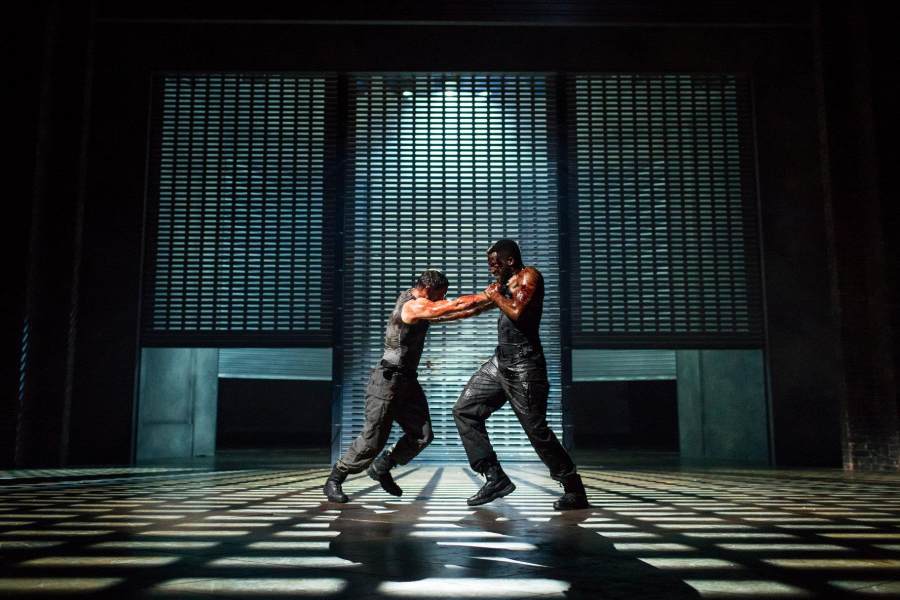

After watching the Royal Shakespeare Company’s production of Coriolanus, it becomes clear that Sope Dirisu was born to be a star. The young actor first worked with RSC in 2012 but quickly has become a favorite, landing his first leading role as the Roman general with political ambitions in one of the Bard’s most harrowing tragedies. On the stage and onscreen, Dirisu commands all eyes towards him, his majestic presence only overcome by his ability to convey humanity in all its gore and glory. When we speak on the phone, I’m taken aback by his incredible sense of humor, he laughs at himself often, and is nothing like the brooding thespian I imagined I’d speak to. He calls Harry Potter “one of the greatest stories” and urges me to read the books, in the same way he invites me to ponder on the nature of theatre.
His portrayal in Coriolanus will be available for worldwide audiences thanks to a filmed version which is playing in theaters in the US, while British audiences can see him in London from Nov 6-18. We spoke about the way in which he approaches his characters, seeking truthfulness in art and life, and what scene from the boy wizard's saga crushes him every time.
Did you change your performance in any way for the day the show was filmed?
No, it’s funny you ask that, because the biggest difference between the recording and a live show is the amount of audience we have. The Royal Shakespeare Theatre in Stratford where the show is recorded can hold 1200 people, but when the cameras are there we lose a lot of audience because the cameras need space, and there was also a crane. That reduces ever so slightly the atmosphere in the room, but in terms of being self-conscious, I’ve done a lot of screen work and I think a lot of the actors had done that as well, so we’re used to acting in front of cameras. We had a couple of camera rehearsals with an audience and without, just to make sure that wouldn’t throw us off. All in all I think the show is quite a true representation of a night at the theatre. If anything as well, actors try to create the feeling that this is the first and last time these characters are saying these words, and there’s a bit of an adrenaline pump when you do it in front of a camera because we’re not making a film, no one’s yelling cut, so there was a finality to the words we were saying because that would be the one that would live forever. It added that level of reality and danger.
You lost audience in the theater but you will most likely have the biggest audience ever worldwide for a specific performance.
The only difference as an actor is when you’re in the room you get their feedback immediately, they gasp, they laugh, they’re listening. As a stage actor the greatest thing is to feel what the audience is feeling, so even if we have the largest audience for that show we didn’t have the feedback. I was told after the show that in one of the scenes where Coriolanus goes to Aufidius, the audience was roaring with laughter in the cinema, but we didn’t get that in the auditorium. Usually you give audiences a little pause so they can absorb everything, but we might have rushed through some of the scenes.
Whenever I see an actor in a Shakespearean tragedy, I wonder if knowing the fate of the character, and knowing the character might be making the wrong choices, ever makes you hope for a different outcome, even if you know it won’t be possible?
Yes, I suppose I do. In the preparation of the character you have to understand that the character believes what he’s doing is right, so regardless of the outcome, even if Coriolanus knew what the end of the play is, he’d never change anything he does. He believes in himself, what he’s saying and what he’s doing. For me it reinforces the notion that when you’re performing nothing can seem like a mistake. Coriolanus would live and die by his morals, he’d do the same thing if he was asked about his life as he died.

Actors develop such a capacity for empathy that I wonder if playing a character like Coriolanus makes you understand people in our world, politicians and xenophobes, who believe they’re making the right choices?
No. Will Poulter who was in Detroit said that as an actor he founded difficult to be in that movie because that racism and xenophobia are not based on truth. There is no part of me that would understand anything like that. With someone like Coriolanus his hatred isn’t based on things people can’t change, like sex, gender, the color of their skin or who they love, rather it’s based on the character of the person. He believes if you’re not willing to fight for your country you’re not deserving to share. I don’t think that’s reflected in the world we live in now, or maybe I’m being too empathetic with my character because the way he goes about displaying his beliefs is not compassionate, but the way he treats the soldiers is different because they’re fighting with him. Even if they’re not as courageous as he is, they left their homes to fight with him, they’re doing what he thinks is right.
Coriolanus has a lot to say about today, but that is truth about any Shakespearean play done well. Why do you think his work remains timeless?
History repeats itself or we haven’t learned from it so we keep suffering from the same illness. Take something like Measure for Measure, Angelo says to Isabella “you can’t tell anyone what’s happening here because no one will believe you,” he tried to rape her and he tells her “do you know who I am? Why would anyone believe this random harlot over me?,” it’s seven lines or so that entirely sum up the Harvey Weinstein situation. It’s horrible to read Shakespeare be so perfectly right, because we haven’t learned as a society to treat and respect women like equals. Not only have we not learned from history, we haven’t changed. Shakespeare wrote about universal themes, about love but also about people with too much power who are unwilling to relinquish it, the way people stir others up to divide them using rhetoric, there are so many things we’ll do until the end of times. The same goes for Ovid and his Metamorphosis, it may be set in ancient times but for better or for worse we haven’t changed.
You studied economics before deciding to become an actor, what elements did the study of economics help you be a better actor?
A big part of me feels like I left that part of me behind and I haven’t been able to make my degree relevant, but I think I was I analyze things through pragmatism, economics is history but also a science and in science one plus one almost always equals two. I say always because I didn’t study theoretical mathematics. I think the way I analyze things can be quite scientific.
Coriolanus is a play about supply and demand.
You’re right.
America is still so behind when it comes to filmed productions, in the UK you’re centuries ahead of that. As someone who has the opportunity to find affordable tickets and see so many productions in cinemas, why would you say it’s important to share theatre digitally?
That’s a really good question because something I discovered during the process of writing Coriolanus is that we don’t know what this is yet. It’s not film, but it’s not a live performance either. You have closeups, so it looks like you’re broadcasting a film. We don’t know what the medium is, so there’s room for a lot of innovation, for someone to come and say this is what I want to do with this medium. It’s so important to broadcast theatre because it’s such a powerful medium in itself, it’s a shared experience, by broadcasting it you make it more acceptable. You also get to have people who can’t afford to travel or can buy tickets, even on Broadway there aren’t many tickets I can afford. Giving people the opportunity to experience something like that is incredible. I wonder if you still have that same shared experience, ‘cause you’re not breathing the same air as the actors, you can’t get on that stage, not that you should (laughs) but in the first fight scene in the play we had people exhilarated every night by the idea that they might get hit by blood. I don’t know if you can recreate that on film. I believe certain stories fit certain mediums, some you have to read, some work on film, some you need on television to allow people to have time to breathe in between episodes. I believe some shows should never be made into films because they need an audience. One day we’ll find out what this medium is, for the time being both for accessibility and in terms of posterity it’s nice to have our Coriolanus so people in the future can compare it to their productions. We have some films of older stage productions, things from the Laurence Olivier era, but they’re films, not recordings.

You had the chance to play Cassius Clay and also be in a J.K. Rowling television series. Is your process for playing a real life person the same as someone from a world of fiction?
It was a different approach, especially because it was Muhammad Ali who was such an icon and hero to so many people that you have a sense that you need to do him justice. Not just by working harder on the truth, but also in terms of physicality I was boxing, lifting weights, I was eating so much to reach his weight, I watched days worth of videos of him moving, fighting, talking. I won’t say I captured him, but I did my best. A friend of mine who saw the show said it was spectacular, how there were moments he forgot it was me, I know I didn’t look like Ali, as much as my agent tried to convince me I do, but to know that my work paid off meant so much to me. When you create a fictional character you have much more license, you just need to stay true to the text, you get to make more decisions. For Cassius Clay a lot of the decisions had already been made, it had to be truthful to what everybody knows to be truth. Everyone took something different from this man, some took his poetry, others his courage, everyone has a little fraction of Ali in their head. I tried to create an objective view of the man.
Since you starred in The Casual Vacancy I’d love to know who’s your favorite character in the Harry Potter world?
I really love Sirius Black and love Gary Oldman’s portrayal of him in the films. His death was hard for me, so was Dobby’s. I was OK with Dumbledore’s death because I knew it was part of a larger plan, characters like him die for a reason, but when Dobby died I was devastated. He was a symbol of the collateral victims of war, he just wanted to be loved, wanted to make the world a better place. Oh my God, I’m welling up a little bit (laughs).
For tickets to Coriolanus in London click here. To find out where to watch the show in cinemas click here.